Thomas Jefferson2.0
托马斯.杰斐逊ppt课件
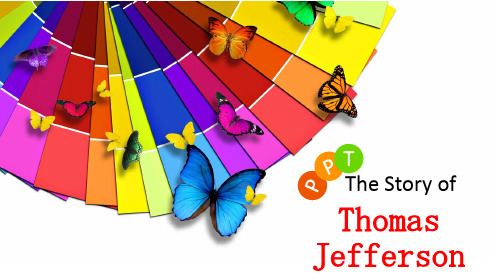
7
ቤተ መጻሕፍቲ ባይዱHOW
生平 5个W
WHO
8
WHERE
WHEN
WHY
HOW
姓名:Thomas Jefferson 中文:乔治·华盛顿 生卒年月:1743年4月2日-1826年7月4日,83岁 重要经历:
➢ 出生于弗吉尼亚州阿尔贝马尔县的一个种植园主家庭。 ➢ 1760-1767,威廉玛丽学院毕业后研修 5 年法律,律师资格。 ➢ 1769 年,杰斐逊当选为弗吉尼亚州议员。 ➢ 1775 年,杰斐逊代表弗吉尼亚州出席第二届大陆会议,并受托
金融学Finance (2012)
第8名
市场学Marketing (2012)
第14名
会计学Accounting (2012)
第26名
国际商务International Business (2011)
第7名 法学院Law School(2013)
第 12 名
达顿工商管理学院Darden Graduate School of Business Administration(2013)
1758年至1760年间,受业于由博学的詹姆斯·毛瑞(James Maury)教士的学堂。杰斐逊寄宿于毛瑞家中,接受古典教育 (classical education),并研习历史与自然科学。
自1760年起至1762年,16岁时杰斐逊入学威廉斯堡的威廉与玛 丽学院哲学系。追随威廉·史莫(William Small)教授,研究数 学、形而上学、与哲学。据闻杰斐逊的学院生涯为每日读书15小 时,随身携带希腊文法书,法文精熟,练习小提琴,喜好塔西佗 与荷马的著作。
故事 3、控制情绪
14
杰斐逊最热爱的运动是骑马。他是位相马行家,自己就有一匹 上等好马。在任总统期间,一天碰到一位知名的赛马骑师,人们叫 他琼斯。
杰弗逊与新闻自由
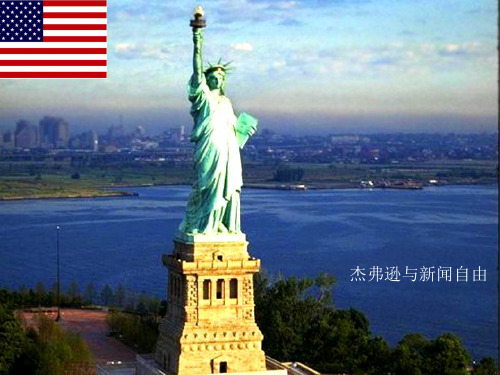
通过法律来保证新闻自由
早在1776年他在为弗吉亚州起草的宪法 草案中就写道:“出版事业应当是自由的。 除非报纸犯了损害人的名誉的罪,才能对 它提出私人控诉。”1787年美国宪法在 国会通过后,他多次表示反对该宪法“没 有制定权利法案来保障自由”。他在列举 需要保障的权利时每次都强调了新闻出版 自由。后来经过他和民主派的不懈努力, 终获通过的“权利法案”成了美国保障新 闻自由最具权威的法律。
新闻自由
新闻自由,或称新闻自由权,通常指政府 通过宪法或相关法律条文保障本国公民言 论、结社以及新闻出版界采访、报道、出 版、发行等的自由权利。这一概念也可以 延伸至保障新闻界采集和发布信息,并提 供给公众的充分自由。
执着的新闻自由观念
“若由我来决定我们是要一个没有报纸
的政府,还是没有政府的报纸,我会毫 不犹豫的选择后者.”
—Thomas Jefferson
杰弗逊对新闻自由的贡献
报刊监督政府,防止政治腐败。 通过法律来保证新闻自由。 新闻自由对探寻真理有重大意义 。
尼克松“水门事件”
1974年3月15日,美国联邦大陪审团裁 定尼克松参与掩盖白宫官员卷入非法进入民主党 总部的水门事件真相的阴谋。该判决依据的一份 重要报告里表明,尼克松竞选班子中有7名成员 犯有阴谋罪。“水门”,即华盛顿水门大厦,他 们潜入其中偷拍文件,窃听竞争对手的谈话等, 后东窗事发,并威胁到总统的信誉等.一些人士要 求弹劾尼克松总统,还有部分人要求总统辞 职· · · · · ·
杰弗逊与新as
Jefferson,1743-1826)是美国独 立战争时期杰出的政治家,思想家, 总统(1801~1809) 生于:1743年4月13日 弗吉尼亚州 古什兰(现阿尔巴马尔) 死于:1826年7月4日 弗吉尼亚州夏 洛茨威尔
杰弗逊
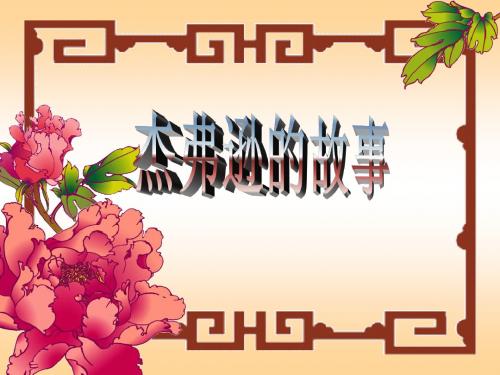
杰弗逊的照片
托马斯· 杰弗逊
托马斯· 杰弗逊(Thomas Jefferson,1743年4月13 日-1826年7月4日),美国第三任总统(1801年 -1809年)。他是《美国独立宣言》和《弗吉尼 亚宗教自由法案》的起草者,是弗吉尼亚大学创 始人。 美国第三任总统(1801年-1809年),亦是 美国最著名的总统之一。他出身贵族家庭,属于 富有阶层。他是《美国独立宣言》和《弗吉尼亚 宗教自由法案》的起草者,是弗吉尼亚大学创始 人。后于1809年3月4日离任,死于1826年7月4日。
托马斯· 杰弗逊
任数: 第三任总统 任期: 1801年3月4日- 1809年3月4日 前任: 约翰· 亚当斯 后任: 詹姆 斯· 麦迪逊 出生日: 1743年4月13日出生地: 维吉尼亚州夏德威尔(Shadwell, Virginia) 逝 世日: 1826年7月4日逝世地: 维吉尼亚州蒙 地沙罗(Monticello, Virginia) 专业: 律师、 农夫 政党: 民主共和党
#037 - Thomas Jefferson, Part 2
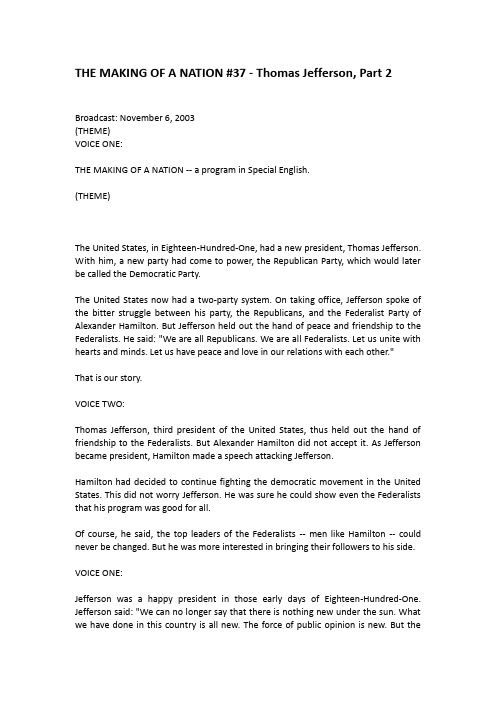
THE MAKING OF A NATION #37 - Thomas Jefferson, Part 2 Broadcast: November 6, 2003(THEME)VOICE ONE:THE MAKING OF A NATION -- a program in Special English.(THEME)The United States, in Eighteen-Hundred-One, had a new president, Thomas Jefferson. With him, a new party had come to power, the Republican Party, which would later be called the Democratic Party.The United States now had a two-party system. On taking office, Jefferson spoke of the bitter struggle between his party, the Republicans, and the Federalist Party of Alexander Hamilton. But Jefferson held out the hand of peace and friendship to the Federalists. He said: "We are all Republicans. We are all Federalists. Let us unite with hearts and minds. Let us have peace and love in our relations with each other."That is our story.VOICE TWO:Thomas Jefferson, third president of the United States, thus held out the hand of friendship to the Federalists. But Alexander Hamilton did not accept it. As Jefferson became president, Hamilton made a speech attacking Jefferson.Hamilton had decided to continue fighting the democratic movement in the United States. This did not worry Jefferson. He was sure he could show even the Federalists that his program was good for all.Of course, he said, the top leaders of the Federalists -- men like Hamilton -- could never be changed. But he was more interested in bringing their followers to his side. VOICE ONE:Jefferson was a happy president in those early days of Eighteen-Hundred-One. Jefferson said: "We can no longer say that there is nothing new under the sun. What we have done in this country is all new. The force of public opinion is new. But themost important and pleasing newness is that we have changed our government without violence. This shows a strength of American character that will give long life to our republic."We have proved that freedom of the press, freedom of speech, and freedom of thought are necessary in a healthy nation. Let men argue with each other. The arguments may become bitter. But the bitterness is just a cloud that passes. And out of the arguments will come the truth."VOICE TWO:As for the Federalist leaders, they too -- except for Hamilton -- were pleased. President Jefferson had said in his inaugural speech: "We are all Republicans. We are all Federalists." This, the Federalist leaders said, showed that Jefferson would not even think of trying to destroy their program.George Cabot, the strongest Federalist leader in New England, usually agreed with Hamilton. But now, he did not. Cabot said, "I believe that our new president wants to stay out of war. We do not have to worry any longer that he plans to join France against England. He is friendly to us and wants our help. Therefore, I am sure that he will not dismiss any of our people from their government positions."VOICE ONE:Another Federalist leader -- Timothy Pickering -- the secretary of state under President Adams, said: "I am satisfied that Jefferson will not make any important changes in government policy, and that he will depend for support more on us Federalists than on the Democrats."During those first few weeks of the new government, the Federalist leaders really believed that Jefferson was afraid of them, that he had surrendered to them and would soon be destroyed as the leader of the Republican Party. One Federalist wrote: "Soon Jefferson will feel the bite of his dirty Democrats when they attack him!"VOICE TWO:Jefferson soon did hear complaints from Republican leaders who felt he was being too kind to the Federalists.William Giles, a Jeffersonian leader in Virginia, wrote: "Of course, I am very pleased by the president's inaugural speech. The president's program is correct. It agrees with the opinions of the people. But I still think that the president's success will depend on how he carries out his program."Let him offer friendship to the Federalists. But he must not permit friendship to become weakness. His friends believe that the first thing he must do is to clean out the executive branch of the government. He must dismiss from office all men who are enemies of the Republican program."VOICE ONE:Even James Monroe wrote a strong letter to the president:"Your speech and your program are healthy and good. But there are serious dangers ahead of you. There are two parties in this country, not one. One of these parties, the Federalists, has controlled the government for twelve years and has hurt our nation greatly. Some of these Federalists now speak softly to you and promise their support."But you must remember, too, that there are thousands of good Republicans who have always supported you. If you keep Federalists in office, if you appoint Federalists to office, many of these good Republicans will stop believing in you."Certainly, there is no reason why you should give jobs to men who worked for the Federalist government of John Adams. Certainly, you must throw out the officials of the last government who stole money and sold their services. Do this and you will give strength to our Republican movement."Please understand me. I am speaking only of high offices. I do not ask that you dismiss small officials because they are Federalists. They have a right to their political beliefs. Let them keep their jobs. This will show that you are a president who can accept different political opinions."VOICE TWO:As the Federalists and the Republican leaders kept asking Jefferson for positions in the government, the president was thinking of his cabinet. He quickly decided who would be his secretary of state and secretary of the treasury.James Madison of Virginia -- Jefferson's old friend and the father of the Constitution -- would be secretary of state. For secretary of the treasury, Jefferson chose Albert Gallatin of Pennsylvania -- the brilliant leader of the Republicans in Congress -- the man who understood economics and finance as well as Alexander Hamilton.For the war department, Jefferson turned to General Henry Dearborn of New England.Jefferson's first choice to be secretary of the navy was Judge Robert Livingston, the great lawyer from New York. But Judge Livingston rejected this position. Jeffersonfinally chose Robert Smith of Baltimore, Maryland.VOICE ONE:The president had already appointed one man from New England to his cabinet, Secretary of War Dearborn. Yet, he went to New England for two more appointments.Jefferson knew that the strength of the Federalist Party was greater in New England than in any other part of the country. He believed that there was no better way to move New England away from the Federalist program than to give cabinet positions to men from New England.And so, Jefferson found his attorney general in Levi Lincoln of Massachusetts. Like Dearborn, Lincoln was a patriot of the American Revolution. He had been a supporter of Jefferson from the beginning. He was famous as a lawyer in Massachusetts, where he was the top leader of the Republican Party.Jefferson went to New England, too, for the postmaster general. It was not yet a cabinet office. But its importance was growing. The president gave this appointment to Gideon Granger -- lawyer, businessman, and writer -- one of the strong Jeffersonians in the state of Connecticut.Such was Jefferson's cabinet. All strong Republicans. All completely loyal. The Federalists were shocked. Not one of their men had been appointed.(THEME)VOICE TWO:You have been listening to the Special English program, THE MAKING OF A NATION. Your narrators were Jack Weitzel and Stuart Spencer.。
托马斯.杰斐逊

13
麦金太尔商学院McIntire School of Commerce(2012) 管理学Management (2012) 金融学Finance (2012) 市场学Marketing (2012) 会计学Accounting (2012)
第26名
国际商务International Business (2011)
第4名
管理学Management (2013)
第12名
企业管理学/创业学Entrepreneurship (2013)
第12名
执行MBA学Executive MBA (2013)
第27名 第18名
会计学Accounting (2012) 市场学Marketing (2012)
在英媒最新公布的全球大学校友财富排行榜中,弗吉尼亚大学排名第 11,在美国公立大学中排名第1,之后是加州大学伯克利分校和密歇 根大学。挤入前20名的非美国大学只有三个:英国牛津大学,排名16; 印度孟买大学,排名18;英国剑桥大学,排名第19。弗吉尼亚大学可 能更感自豪的是,它白手起家的富翁校友是最多的,比例高达78%。 这也说明,学校出色的教育在学生毕业后的社会实践中获得了巨大成 功。校友的卓越表现更加凸显了弗吉尼亚大学的价值。
7
姓名:Thomas Jefferson 中文:托马斯·杰斐逊 生卒年月:1743年4月2日-1826年7月4日,83岁
生平
5个W
WHO WHERE WHEN WHY HOW
8பைடு நூலகம்
姓名:Thomas Jefferson 中文:乔治·华盛顿 生卒年月:1743年4月2日-1826年7月4日,83岁 重要经历: 出生于弗吉尼亚州阿尔贝马尔县的一个种植园主家庭。
杰斐逊的启蒙思想的总结
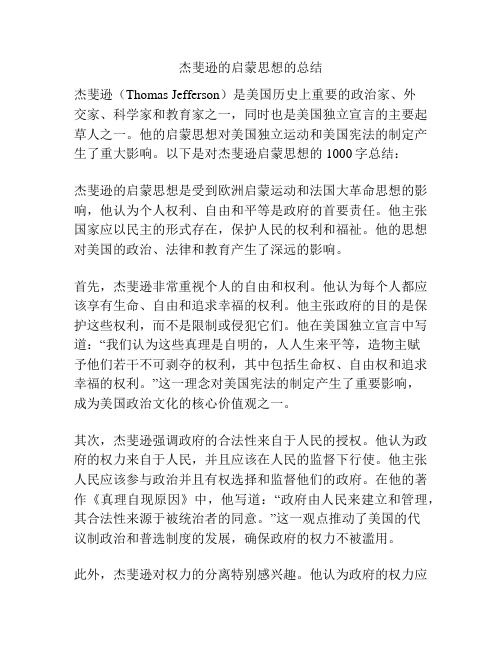
杰斐逊的启蒙思想的总结杰斐逊(Thomas Jefferson)是美国历史上重要的政治家、外交家、科学家和教育家之一,同时也是美国独立宣言的主要起草人之一。
他的启蒙思想对美国独立运动和美国宪法的制定产生了重大影响。
以下是对杰斐逊启蒙思想的1000字总结:杰斐逊的启蒙思想是受到欧洲启蒙运动和法国大革命思想的影响,他认为个人权利、自由和平等是政府的首要责任。
他主张国家应以民主的形式存在,保护人民的权利和福祉。
他的思想对美国的政治、法律和教育产生了深远的影响。
首先,杰斐逊非常重视个人的自由和权利。
他认为每个人都应该享有生命、自由和追求幸福的权利。
他主张政府的目的是保护这些权利,而不是限制或侵犯它们。
他在美国独立宣言中写道:“我们认为这些真理是自明的,人人生来平等,造物主赋予他们若干不可剥夺的权利,其中包括生命权、自由权和追求幸福的权利。
”这一理念对美国宪法的制定产生了重要影响,成为美国政治文化的核心价值观之一。
其次,杰斐逊强调政府的合法性来自于人民的授权。
他认为政府的权力来自于人民,并且应该在人民的监督下行使。
他主张人民应该参与政治并且有权选择和监督他们的政府。
在他的著作《真理自现原因》中,他写道:“政府由人民来建立和管理,其合法性来源于被统治者的同意。
”这一观点推动了美国的代议制政治和普选制度的发展,确保政府的权力不被滥用。
此外,杰斐逊对权力的分离特别感兴趣。
他认为政府的权力应该分散到不同的机构,在其中相互制衡和监督。
他提倡在行政、立法和司法方面建立相互独立的机构,以防止权力集中和滥用。
这一原则被写入美国宪法,并成为美国政治体系的基石。
此外,杰斐逊对教育的重要性有着深刻的认识。
他认为普及教育是维护自由民主的关键。
他在弗吉尼亚州立法提案中写道:“我们必须通过提高教育的普及程度,培养和保护下一代的能力和道德价值观。
”他建立了弗吉尼亚大学,旨在培养合格的公民和领导人,以确保未来美国的繁荣和自由。
最后,杰斐逊是位资深科学家,他认为科学和理性思维是推动社会进步和改善人类生活的关键。
英语故事-Thomas Jefferson
英语故事Thomas Jefferson美国第三届总统托马斯•杰佛逊Thomas JeffersonIn the thick of party conflict in 1800, Thomas Jefferson wrote in a private letter, “I have sworn upon the altar of god eternal hostility against every form of tyranny over the mind of man.”This powerful advocate of liberty was born in 1743 in Albemarle county, Virginia, inheriting from his father, a planter and surveyor, some 5,000 acres of land, and from his mother, a Randolph, high social standing. He studied at the college of William and Marry, then read law. In 1772 he married Martha Waylays Skelton, a widow, and took her to live in his partly constructed mountaintop home, Monticello.Freckled and sandy-haired, rather tall and awkward, Jefferson was eloquent as a correspondent, but he was no public speaker.In the Virginia house of burgesses and the continental congress, he contributed his pen rather than his voice to the patriot cause. As the “silent member” of the congress, Jefferson, at 33, drafted the declaration of independence. In years following he labored to make its words a reality in Virginia. Most notably, he wrote a bill establishing religious freedom, enacted in 1786.Jefferson succeeded Benjamin Franklin as minister to France in 1785. His sympathy for the French revolution led him into conflict with Alexander Hamilton when Jefferson was secretary of state in president Washington’s cabinet. He resigned in 1793.Sharp political conflict developed, and two separate parties, the federalists and the democratic-republicans, began to form. Jefferson gradually assumed leadership of the republicans, who sympathized with the revolutionary cause in France. Attacking federalist policies, he opposed a strong centralized government and championed the rights of states.As a reluctant candidate for president in 1796, Jefferson came within three votes of election. Through a flaw in the constitution, he became vice president, although an opponent of president Adams. In 1800 the defect caused a more serious problem. Republican electors, attempting to name both a president and a vice president from their own party, cast a tie vote between Jefferson and Aaron burr. the house of representatives settled the tie. Hamilton, disliking both Jefferson and burr, nevertheless urged Jefferson’s election.When Jefferson assumed the presidency, the crisis in France had passed. he slashed army and navy expenditures, cut the budget, eliminated the tax on whiskey so unpopular in the west, yet reduced the national debt by a third. He also sent a naval squadron to fight the Barbary pirates, who were harassing American commerce in the Mediterranean. Further, although the constitution made no provision for the acquisition of new land, Jefferson suppressed his qualms over constitutionality when he had the opportunity to acquire the Louisiana territory from napoleon in 1803.During Jefferson’s second term, he was increasingly preoccupied with keeping the nation from involvement in the Napoleonic wars, though both England and France interfered with the neutral rights of American merchantmen. Jefferson’s attempted solution, an embargo upon American shipping, worked badly and was unpopular.Jefferson retired to Monticello to ponder such projects as his grand designs for the university of Virginia. A French nobleman observed that he had placed his house and his mind “on an elevated situation, from which he might contemplate the universe.”He died on July 4, 1826.。
美国往事——《独立宣言》的起草者托马斯杰斐逊
美国往事——《独立宣言》的起草者托马斯·杰斐逊(Thomas Jefferson) ·老 钱·“在大多数情况下,大多数人的意见会被采纳,但是那些意见必须合理而公正,而且其他少数人也应拥有同样的权利,平等地受到法律的保护,若非如此,无异就是高压手段。
”——托马斯·杰斐逊美国独立革命中,产生了三份对后世影响至深的政治文件。
一是《独立宣言》,它奠定了北美独立之路,给出了北美独立的正当性;二是《美国宪法》,它奠定了美国的政治体制,制订了政府官员的产生办法,界定了政府的权限,和地方政府与中央政府的关系;三是《联邦党人文集》,它告诉世人以《美国宪法》作为治国的根本,美国的政治生态会怎样。
其中,以《独立宣言》最为重要,因为它以人类自身创立的抽象理论,启蒙学说为依据,指出了为什么北美要独立,为什么北美人民要建立自己的共和国;还进一步指出了人的自然权力是什么,提出了一个全新的国家理论,那就是国家的目的是为了保障公民的自然权利和自由。
正是这样一个为政宣言,联合起了北美十三个殖民地,推翻了英国的统治,在北美建立了人类第一个近代国家。
这是一件史无前例的大事。
此前,任何一个国家都是先有种族,语言,宗教,文化及地理上的认同,然后以这些认同为依据建立起民族国家。
美国则不然,美国建立在《独立宣言》之上,建立在人权这一抽象的理论之上。
《独立宣言》是关于政治权威的道德基础的协议,不同意者大可不必参与此事。
但是,《独立宣言》和支撑它的启蒙思想是如此有效,在北美大地上由此产生了人类第一个近代国家。
从此以后,所有其它国家的治理程序的合理性都要被重新检验,任何以宗教和传统立国的国家政权都有了不保之虞。
人们不禁要问,写出《独立宣言》的人是一些什么样的人,是什么样的生活经历和价值观让他们有如此的远见。
《独立宣言》作者中的最重要的一位就是本文的主角,托马斯·杰斐逊,他是美国第一届国务卿,第三届总统,弗杰尼亚大学的创始人。
介绍托马斯杰弗逊的英语作文
介绍托马斯杰弗逊的英语作文介绍托马斯杰弗逊的英语作文In the thick of party conflict in 1800, Thomas Jefferson wrote in a private letter, I have sworn upon the altar of God eternal hostility against every form of tyranny over the mind of man.This powerful advocate of liberty was born in 1743 in Albemarle County, Virginia, inheriting from his father, a planter and surveyor, some 5,000 acres of land, and from his mother, a Randolph, high social standing. He studied at the College of William and Mary, then read law.In 1772 he married Martha Wayles Skelton, a widow, and took her to live in his partly constructed mountaintop home, Monticello.Freckled and sandy-haired, rather tall and awkward, Jefferson was eloquent as a correspondent, but he was no public speaker. In the Virginia House of Burgesses and the Continental Congress, he contributed his pen rather than his voice to the patriot cause. As the silent member of the Congress, Jefferson, at 33, drafted the Declaration of Independence. In years following he labored to make its words a reality in Virginia. Most notably, he wrote a bill establishing religious freedom, enacted in 1786.Jefferson succeeded Benjamin Franklin as minister to France in 1785. His sympathy for the French Revolution led him into conflict with Alexander Hamilton when Jefferson was Secretary of State in President Washingtons Cabinet. He resigned in 1793.Sharp political conflict developed, and two separate parties, the Federalists and the Democratic-Republicans, began to form. Jefferson gradually assumed leadership of the Republicans, who sympathized with the revolutionary cause in France. AttackingFederalist policies, he opposed a strong centralized Government and championed the rights of states.。
托马斯·杰弗逊
>>于1774年立宣言全文。
……
杰弗逊于1801年 至1809年间担任总 统,为首位于白宫任 职并离任的总统。这 也是民主共和党党员 首次选上总统。截至 目前为止,杰弗逊为 唯一担任过美国副总 统后又选上总统,且 任满两个任期者。
你的任务目标是探索密苏里河和极 其主要支流,例如,其河道和通达 太平洋的水道……可作为商业用 途、横跨大陆的直接和实用的交通 水路。 ——托马斯·杰斐逊
back
杰弗逊墓碑
维吉尼亚大学 之父 以及 维吉尼亚 宗教自由法 美国独立 宣言 作者 托马斯·杰弗逊 长眠于此 HERE WAS BURIED THOMAS JEFFERSON AUTHOR OF THE DECLARATION OF AMERICAN INDEPENDENCE OF THE STATUTE OF VIRGINIA FOR RELIGIOUS FREEDOM AND FATHER OF THE UNIVERSITY OF VIRGINIA
杰弗逊签署文件
任 内 事 件
第一次巴巴利战争 (1801‐1805) 路易西安纳购地 (1803) 成立奥勒冈属地 (1804) 伯尔谋叛 (1805) 批准美国宪法第廿修正案 (1804) 刘易斯与克拉克探勘 (1804‐1806) 废除国内奴隶贸易(1808)
杰弗逊逝于 1826年7月4日, 当日为独立宣言通 过五十周年纪念 日,与约翰·亚当 斯同日弃世。
• April 13, 1743 – July 4, 1826
托马斯·杰弗逊(Thomas Jefferson,1743年4月13日 ─1826年7月4日) 为美利坚合众国第三任总统 (1801年─1809年)。同时也 是美国独立宣言(1776年)主 要起草人,及美国开国元勋中 最具影响力者之一。其任期中 之重大事件包括路易西安那购 地案(Louisiana Purchase, 1803年)、1807年禁运法案 (Embargo Act of 1807 年)、以及路易斯与克拉克探 勘(Lewis and Clark Expedition, 1804–1806 年)。
